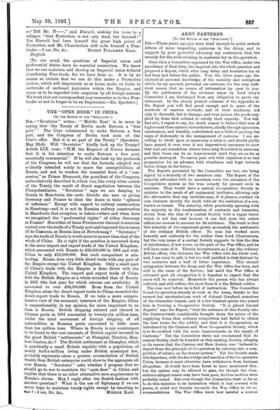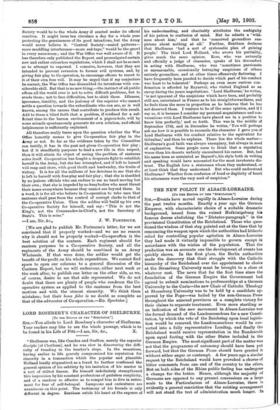ARMY CANTEENS.
[To THE EDITOR OP THE " SPECTATOR.")
Slit,—Three years ago you were kind enough to print certain letters of mine respecting canteens in the Army, and to support by your powerful advocacy my contention that the remedy for the evils existing in canteens lay in Co-operation.
Since then a Committee appointed by the War Office, under the presidency of Earl Grey, has inquired into the whole question and prepared a Report, which after long delay and hesitation has at last been laid before the public. You, Sir, three years ago dis- claimed all personal knowledge of the rascality and corruption
which, by my account, pervaded our canteens, for the very suffi- cient reason that no source of information lay open to you.
By the publication of the evidence taken by Lord Grey's Committee I am discharged from any obligation to prove my statement. In the closely printed columns of the Appendix to the Report you will find proof enough and to spare of the misdeeds of canteen stewards, and of their readiness, not
only to discredit, but to damage, and even poison, the goods sup- plied by firms that refused to satisfy their rapacity. You will find also, I regret to say, too much reason to believe that men .if higher rank than canteen stewards have, chiefly through ignorance, carelessness, and timidity, contributed not a little to prolong the reign of dishonesty in the management of canteens. I am un- willing to dwell upon so unsavoury a subject, and should gladly have passed it over, were it not imperatively necessary to show that real and scandalous abuses have long flourished in canteens, and that there can be no improvement until they are as far as possible destroyed. To survey past evil with repulsion is no bad preparation for an advance with steadiness and hope towards better things in the future.
The Reports presented by the Committee are two, one being signed by a minority of two members only. The Report of the majority advocates with no uncertain voice the extension of the Co-operative system as the true remedy for present evils in canteens. They would have a central Co-operative Society to minister to the needs of all regimental institutes, allowing only
the alternative that any institute may, if it pleases, conduct its own business strictly for itself, without the mediation of a con- tractor as tenant. The minority, while practically agreeing with the majority in the condemnation of contracts and tenancies, shrink from the idea of a central Society with a vague terror which is not less real because it can find none but rather
ridiculous reasons to account for its existence. The truth is that this minority of two represents pretty accurately the sentiments of the ordinary British officer. No man has worked more honestly and zealously for the soldier than Lord Cheylesmore, but the very name of a central Society suggests to him the idea of interference, if not worse, on the part of the War Office, and he will have none of it. Therein he represents, as I say, the ordinary British officer, who distrusts the War Office with his whole soul, and, I am sorry to add, is but too well justified in that distrust by two centuries and a half of bitter experience. This eternal antagonism between the Army and the War Office has been, and still is, the curse of the Service; but until the War Office is reformed past all recognition it is hopeless to expect that the curse will be removed. Meanwhile the person who has always suffered, and still suffers, the most from it is the British soldier. '
The case now before us is full of instruction. The Committee found Co-operation already at work in the Army, thanks to the earnest but unostentatious work of Colonel Craufurd, sometime of the Grenadier Guards, and of a few kindred spirits who joined him in forming a Co-operative Society. "It is placed beyond dispute," says the Report, "that the entrance of this Society into the Canteen-trade considerably brought down the prices of the supplying firms, that ordinary competition had failed to obtain
the best terms for the soldier, and that it is Co-operation, as
introduced by the Canteen and Mess Co-operative Society, which is to be credited with the main improvements in the supply of Canteens." Yet the Committee dares not recommend that its central Society shall be founded on this existing Society, alleging as its reason that the Canteen and Mess Society was " induced to depart from the principle of Co-operation by entering into a com- petition of rebates on the tenant-system." Yet the Society made this departure, with the knowledge and sanction of the Co-operative Union, because it must otherwise have withdrawn from business altogether. It would have been fairer to have mentioned this ; but the matter may be allowed to pass, for though the Com- mittee's alleged reason may have been poor, its true motives were probably sound. But even though the Committee went so far as to do this injustice to an institution which it had covered with praise, it could not thereby reconcile the War Office to its re- commendations. The War Office knew how hateful a central Society would be to the whole Army if erected under its official sanction. It might issue ten circulars a day for a whole year protesting the genuineness of its good intentions, but the Army would never believe it. "Central Society—sealed patterns— more muddling interference—more red-tape," would be the growl in every mess-room ;‘ and the War Office was well aware of it. It has therefore only published the Report. and promulgated certain new and rather colourless regulations, which I shall not be so rash as to attempt to expound. I conceive, however, that they are intended to prevent reversion to former evil systems, and, by giving fair play to Co-operation, to encourage officers to resort to it of their own free will. It may be urged that if my conjecture be correct, the War Office has dissembled its intentions with con- siderable skill. But that is no new thing,—the instinct of all public offices all the world over is not to solve difficult problems, but to evade them ; not to face difficulties, but to shirk them. Idleness, ignorance, timidity, and the jealousy of the superior who cannot settle a question towards the subordinate who can are, as is well known, among the causes that contribute to produce this result. Add to these a blind faith that a problem, if confined for a suf- ficient time to the barren environment of a pigeon-hole, will by some miracle spontaneously generate its own solution, and official helplessness is sufficiently explained.
All therefore really turns upon the question whether the War Office honestly means to give Co-operation fair play in the Army or not. So far as the evidence taken by the Committee can testify, it has in the past not given Co-operation fair play ; but if it steadfastly purposes to lead a new life in this respect, then it will attain its object of seeing the problem of canteens solve itself. Co-operation has fought a desperate fight to establish herself in the Army, but she has triumphed, and if left to herself will reap and store, with good thrift and husbandry, the fruits of victory. It is for all the millions of her devotees to see that she is left to herself with free play and fair play ; that she is shackled by no jealous officials who can endure to see no hand moving but their own ; that she is impeded by no busybodies who must thrust their noses everywhere because they cannot see beyond them. In a word, it is for all who believe in Co-operation to take care that canteens shall pass from the control of corrupt clerks to that of the Co-operative Union. Then the soldier will build up his own Co-operative Society for himself, and say : " This is not the King's, not the Commander-in-Chief's, not the Secretary of State's. This is mine."
[We are glad to publish Mr. Fortescue's letter, for we are convinced that if properly worked—and we see no reason why it should not be properly worked—Co-operation is the best solution of the canteen. Each regiment should for canteen purposes be a Co-operative Society, and all the regiments of the Army should be combined in an Army Wholesale. If that were done, the soldier would get the benefit of the profit on his whole expenditure. We cannot find space to open our columns to a general discussion of the Canteen Report, but we will endeavour, either next week or the week after, to publish one letter on the other side, as we, of course, desire to see that side represented. We do not doubt that there are plenty of people who condemn the Co- operative system as applied to the canteens from the best motives and with the utmost sincerity. We think them mistaken; but their bona fides is no doubt as complete as that of the advocates of Co-operation.—En. Spectator.]







































 Previous page
Previous page